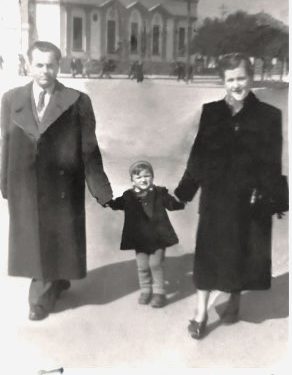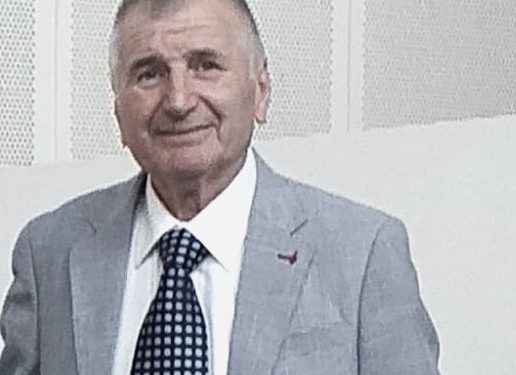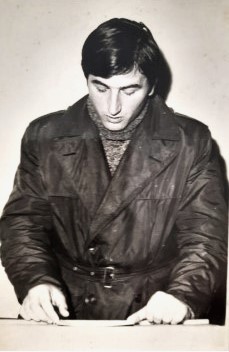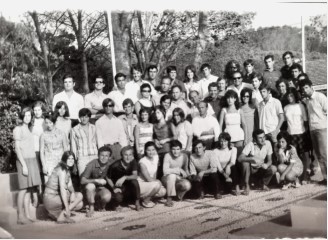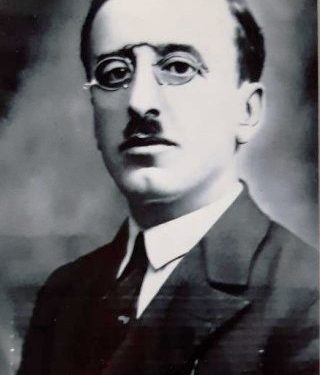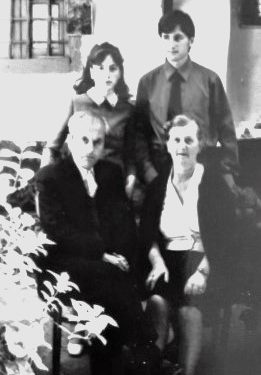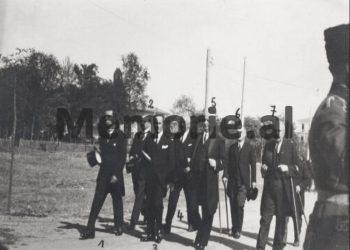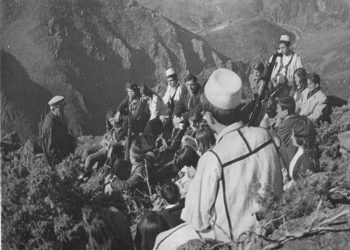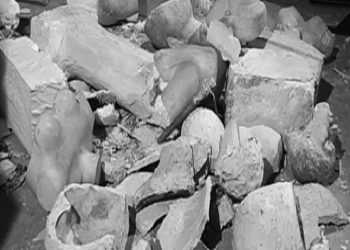By Nestor Topencharov
The fourth part
THE DRAMA OF LIFE
(THE STORY OF A FAMILY)
I dedicate this book to: All fellow sufferers. Their families. And in particular, to people who did not have the opportunity to tell the odyssey of life, during the communist dictatorship.
FOREWORD
Memorie.al / I were born in the city of Korça, on October 22, 1953. I left Albania in October 1990, after we were given the right to repatriate to Yugoslavia (now North Macedonia) . In June 1992, I immigrated to Italy, where I still live today. Although I have been away for 32 years, I did not cut ties, as Albania was the country of my birth, where I spent 37 years, and that part of my blood is Albanian. Years later, the ties with Albania were strengthened, as I also took my wife from Durrës. We came every year on vacation, but the short time of our stay meant that many contacts were cut off. However, true friends and comrades remained forever in my heart.
In the last three years, I did not have the opportunity to visit Albania. But during 2022, I came several times. My commitment on the one hand and the coincidence on the other, made it possible for me to re-establish connections with friends and colleagues whom I had not seen for decades. Knowing my past, some of them advised me to write down what had happened in my life. At first, this idea seemed like a utopia to me, since even though I had been a good student; I had no inclination towards drafting. Then I reflected. I would just write my story, true events, where not much inspiration was needed. Perhaps a writer would know how to present these events, as a true pen artist knows. While I will write them, without many descriptions: briefly, simply, naked, as they happened.
Something else that pushed me even more to write this book was an interview on TV Klan, which I saw in October of this year, directed by the well-known journalist Blendi Fevziu. I didn’t seek revenge. But I didn’t even have justice. With the help of this book, I will make known to the Albanian public opinion, the role of the individuals who contributed to my suffering and that of my family. And today, I am putting my finger on these “beings”, not for the task they had, but for the way they performed it. I will start my writing with my grandfather, from my mother’s side, to continue with my father, where I will touch on the most important moments of their lives. This will help the reader to know my background.
Then I will also talk about myself. In this book I will also tell some events, one more dramatic than the other, that happened to people I had the honor of knowing. I am glad that many books have been published about the suffering and persecution of “enemies of the people” and their families in internment camps and prisons during the communist dictatorship. I was able to read some of these works. I believe that this book, in a modest way, will contribute to know even more the inhuman methods of the State Security, the way they created accusations and how they destroyed people and families to keep the people under terror.
Author
December, 2022
Continues from last issue
CHAPTER TWO
It was October 16, Saturday. After I got home from work that evening, I worked late to plaster the bathroom wall. To finish it off, I had taken leave for the next day as well. It was apple picking campaign time. In agriculture, when it was campaign time, there were no days off. I experienced this many years later, when I worked at the “Korça” Agricultural Enterprise. As always, during these campaigns they also organized neighborhoods with pensioners, school students and enterprises.
It rained all night. In the morning, from 05:00 a.m., cars with loudspeakers were circulating around the city, announcing that the action had been canceled due to heavy rain. After a while I hear a knock on the door. My mother had been up since before, because since our father was arrested, she slept in bits and pieces and got up early in the morning.
After opening the gate, he saw the Branch driver, who asked him to get ready, that they were looking for him in the Domestic Branch. I wanted to accompany him, but my mother stopped me, since I had worked late and it was good to relax. She would go with Ivana. They got ready, but when they got to the door, the driver changed his version and told them that they were looking for me.
I got dressed and greeted my family members. My mother wanted to give me the umbrella, but I didn’t take it, since I would drive the way and when I return, I would pass under the shelters of the roofs. I greeted the driver, but he only answered with a: “get in”, dry. When the car went 30-40 meters, I turned my head to look at the house. I noticed 5-6 people who had come out of the alley and were heading towards my house. I understood that a new check was going to be done.
I did not assist in any of the controls. I don’t know if it was a coincidence or planned. My house was in a cobbled alley, about 200 meters above the “Unknown Soldier” monument. As soon as “Gas” left the asphalt, I looked at the city operative, who raised his hand to the driver. “Gas” stopped and he got into the front seat.
Until the car passed the “Morava” Cinema, he was talking to the driver about the bad time of that night. Then suddenly, he turned his head back and as if surprised to see me there, greeted me. When we arrived in front of the branch, I told the driver that he would accompany me. Everything was organized.
Irakli Koçollari was waiting for me on the steps of the palace. To my greeting, he responded with a gesture for me to follow him. We passed through a corridor of the palace and entered a room furnished with a single bed, a wardrobe, a table, two chairs and, perhaps, some other thing, which I do not remember. I entered this environment for the first time. It was his bedroom.
Unlike other times, this morning was very cloudy. I thought that maybe the fact that, because of me, he had disturbed his sleep early had also had an effect. He kept me on my feet. It looked like he wanted to finish work with me quickly and then rest.
He asked me:
– “What do you have to say”?
– “Nothing that might interest you, for anyone”, – was my answer.
He saw me with all his anger, adding that he was not talking about others, but about me. In a fierce voice, he asked me to talk about my hostile activity. After receiving a negative answer, he told me that he would put me in jail.
I am surprised even now, after 46 years, how these words did not make any impression on me. The most difficult moment I had gone through was the first night without my father. Maybe it was the suffering of that night that made me strong, to face the difficulties that life would offer me. Maybe not life, but dictatorship.
– “I’m ready”, – I told him.
This was followed by the removal of the trouser belt, shoelaces and wristwatch. After I took these actions, he made a phone call and after a while a policeman appeared, whom he ordered to put handcuffs on me. I held out my hands, but he told me that I had to turn them back and join them back to back. After handcuffing me, the policeman escorted me down a corridor, then down the stairs leading to the basement.
Several doors with iron bars were opened there. In a large corridor, there was a young policeman standing guard. This corridor was surrounded by many doors, which were those of dungeons. These doors had a latch blocked by a key. At a height of about 1.6 meters, they had a counter, which was closed with sheet metal. We were led to one of these doors, in front of which I noticed a pair of light brown calfskin sneakers. After removing the irons, the policeman ordered me to leave my shoes in the corridor and after opening the cell door, he let me inside.
The dungeon was small, half dark. It was about 2.5 meters long and 1.5 meters wide. Three quarters of it was underground. From the inside of the door, to the counter closed with sheet metal, there was a dense wire mesh, which had a hole in the center. Then I found out that it was used to light a cigarette. In the wall above the door, near the ceiling, was a small niche, with ribs about 10-12 cm.
Inside it was a lamp with a weak light, which was burning day and night. On our side, it was isolated with a wire mesh and thick bars. On the wall opposite the door, at ceiling height, there was a window about 30 cm. wide and 25 cm. high, from which very little light came in during the day, since this too, in addition to the bars and netting, also had a sheet metal cover on the outside.
In the beginning I gave you the description of this cell, which would become my residence for eight months. I spent the last period, of one and a half months, in two different camps. In the cell or dungeon, I was most of the time, the second, the third, but in special moments the fourth. In general, this is where the defendants were kept, during the investigation, until they received the final sentence. Then the convicts were transferred to the prison. Kaushi was a large room with a capacity of 15-20 people. There were usually ordinary prisoners, for minor crimes, and the rest of convicts, who were waiting for the auto-jail.
The first moment I entered the cell, I barely made out a shadow. Then, little by little, my eyes got used to it and the previous picture became clearer. He was a young man, in his thirties, bald, with a developed physique. He greeted me and invited me to sit down. Fortunately, the dungeon had wooden floors. We didn’t have a mattress, only two blankets, it was not known how long they had been used and I believe they had never been washed.
When we folded them, to sit during the day, we had to be careful that the dust suffocated. After a while that boy introduced himself. His name was Josif and he was from Tirana. He told me that he had tried to escape and had been caught from the villages of Bilishti. While I told them that they accused me of being an enemy, without knowing why. I expressed my innocence and the hope that after everything was clarified, they would release me.
I still believed in justice. He smiled bitterly, telling me that if you were arrested on political charges, it was very difficult, if not impossible, to get released. If you were not released within 72 hours, you would be punished. It seemed absurd to me, but I soon realized the truth of these words.
Sometime around noon, the dungeon gate opens. The policeman beckoned me to come out, handcuffed me and took me to Reshat’s office. Short, fat and red-faced, as I have described to you, he began insistently to ask me to tell about my father, others and myself. I addressed him with my friend Reshat. He told me that I was not his friend, that I was his enemy.
This individual and his friends, who did not believe in God, that the real masters of this country had killed, imprisoned or exiled them, asked to be called master. I did not know about my father that he had engaged in hostile activities. The others, I never found out who they were. As for me, I was clear that I had not done anything illegal. After not getting the answers he expected, he ordered the police to take me back to the dungeon.
I told my cellmate about my first interrogator. Then I fell into silence, thinking about the absurd questions asked. For questions that had no answer. Night came and we fell asleep. When I lay down, I felt one of the floorboards hit one of my kidneys. Then I moved and luckily, the rest was more orderly.
The next day I was taken to the interrogator in the morning and in the afternoon. The questions were the same. The answers were the same. Even in the days that followed, the investigation continued two or three times a day. There were times when I was kept for hours. In those days, the pressure was too great. All those questions, threats of all kinds. The environment they put me in, the bad food they gave me. I wondered what the future had in store for me and my father. I was also worried about the bad luck of my mother and sister.
In the following days, apart from the general questions about Yugoslavia and others, there was also the request, where I had hidden the gold. Reshat, red by nature, blushed even more during the investigation. He often came close to me, contorting his eyes and face to make him look even scarier than he was, to scare me. At one point, after giving me a few quick slaps, she accused me of sticking out her breasts.
I had not noticed that I had done this action. For me, these were difficult moments. However, I remembered the proverbs of the people. “To the enemy and the wind, take out your chest.” Apparently this had infuriated the boss. The confidence I felt in myself, during the investigation, made me even more courageous.
On Friday, October 22, the day of the birthday, the gift of State Security was zero haircuts. I remember that our hair was cut this way for the last time, in the fall of 1970. And this time, forced, when we did the choir in high school, in the military ward of Bilishti. Then, when we finished the one-month choir, I remember the sadness of the high school principal, who had not approved this action, as now the school looked like a barracks.
But those were other times. During the investigation, Reshat’s pressure was not over. Even now, after 47 years, I remember many of his expressions. Like talking to a reed. He said that I (the enemy) was one and they (the dictatorship) were many.
He talked about the force of the Security, which made you show the mother’s milk that you drank. That before they followed the rabbit (meaning the enemy) with a chariot, but now the rabbit entered the chariot by itself. That what the government would do, not even the god would do. For the latter, he was right.
These comparisons of his were not over. One day, a female prosecutor assisted the investigator. Flora was called. They started a conversation between them, letting me understand that 80 ALL was waiting for me. At that time, that was the value of a bullet. After two weeks of investigation with the boss, Irakli Koçollari took me to the investigation.
From the beginning, he tried to be confident, as a Security officer, that he knew his trade well and that he would make me accept all the charges. During his investigation, he met me not only during the day, but especially at night. After 23.00 Sometimes even after midnight, when there was not even a policeman on duty. He was coming to pick me up and take me back to the dungeon. I didn’t know if he lacked sleep, or if he wanted to make my existence even more difficult.
Even Koçollari continued to play his flute, but in the hole that Reshat played. Apparently they only learned that hole. He was investigating me in his bedroom, where he had informed me of his arrest. Accusations continued, for connections with the Yugoslavs and for the hostile activity I had done. During the entire period of the investigation, they always kept me on my toes. But, at Irakli, I was privileged, because he always kept me connected.
In addition, there were times when he reeked of alcohol, and when he began to lose confidence, he became foul-mouthed. Like a thug. His apparent education, “as a man with school”, had remained a distant vision. His true nature had come to light. The night in the dungeon was spent sleeping, (if we will give it a name), while during the day with Josif, we showed movies and novels, which one or the other did not know. Then we played with movie titles.
He had been, since childhood, very fond of cinema. In addition, we had taken a small bar of soap, with which, on one of the dark blankets, we made the dashes of a game, where we used small pieces of bread as stones. All this helped my brain to calm down from the constant pressure of the investigation.
One morning in the dungeon they bring us a young man, dressed as a soldier. His name was Maqo. He served in the army in Bilisht and his house was close to the ward. He often went at night, without permission, to sleep at home and in the morning he returned to the barracks. They had caught him that morning. Josif calmed him down, saying that for the few hours he had been absent, they would forgive him. In the afternoon, they took him to the investigator, but when he returned, Maqo was very worried. It was about a ward officer. We left him to his own devices.
The next day they took him back and when he came back he was in tears. I was 2-3 years older, I had a much bigger charge to face, however this did not prevent me from giving him courage. After he calmed down a bit, he told us that the head of Corps Security asked him to report Niko, an officer with whom Maqo was hanging out. They wanted to punish this young officer for agitation and propaganda. Niko had a grandfather in America who had sent his grandson a hand-held radio. He had received this radio in the department.
They had asked him what music Niko listened to and what conversations he had with him. Maqo replied: “I don’t know if he has done anything bad, I hang out with him to get some permission”! Then the head of the Corps Security had slapped him and threatened him that he would punish him with the maximum penalty for leaving without permission.
At this time, an elderly officer (deputy head of Corps Security) had entered the office, who, after escorting his boss, had spoken to him very kindly. (Good cop and bad cop game).
– “I also have a son, the same age. I have you as my son and I am sorry that you are punished. That’s why it’s good to talk about Niko’s conversations about foreign music and life abroad. Until tomorrow, I will protect you.”
The “good” one said these things. – “But when you come, you must tell me everything and I will release you. Otherwise, you will be handed over to the investigation. “The Security officer ended the conversation with these words. Memorie.al
The next issue follows




